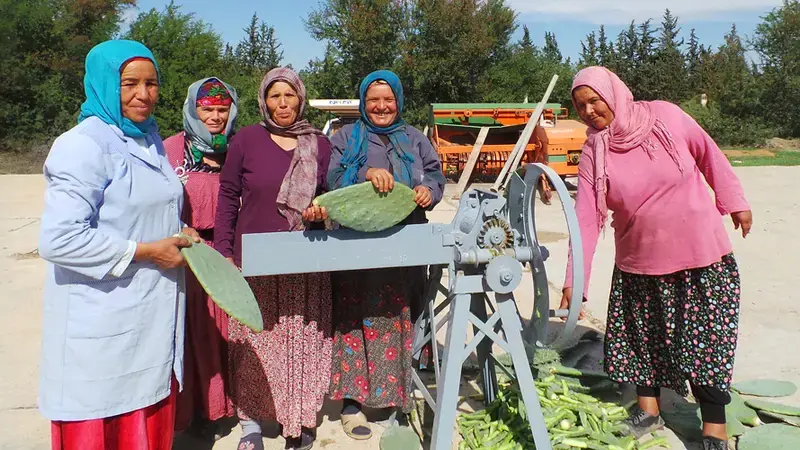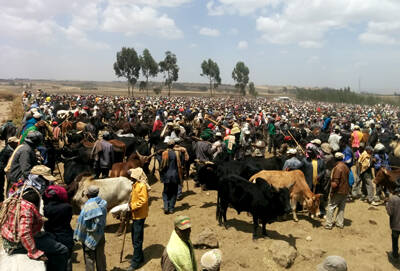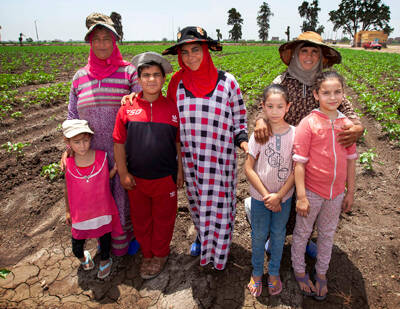Enhancing dryland livelihoods helps tackle climate-change induced migration

ICARDA's innovative climate-smart agricultural solutions strengthen drylands livelihoods' resilience and provide rural communities with opportunities to build productive lives and more reasons to remain in their homelands
Due to the severe impact of climate change on agriculture, global food security faces increased challenges. Warmer weather, water scarcity, environmental degradation, and severe droughts in addition to shocks like COVID-19, combine into a perfect storm that threatens the sustainability of rural livelihoods, especially in the dry regions. As food systems flounder, farming communities struggle with fewer opportunities, especially for women and young people, forcing them to look for better lives elsewhere, or, for the most vulnerable, to stay trapped where they are.
Yet, perilous and costly migratory journeys and the pressure those flows place on nearby urban centers and countries, emphasizes the importance of research-for-development aimed at improving the resilience of communities reliant on agriculture.
It is becoming increasingly obvious that climate change is exacerbating the underlying causes that affect migration decisions. According to The International Organization for Migration (IOM), migration can be an adaptation strategy to climate change. For example, climate change intensifies water stress in dry regions where this vital resource - water - is already scarce.
Research-for-development on the effects of climate change on agriculture and natural resources-reliant communities increases understanding of one of the root causes of migration. Placing communities' needs and behaviors at the center of the research drives development of innovative and resilient agriculture approaches, products and services, and delivers improved and stable economic environments for rural communities as an incentive to stay where they are.
To better understand the underlying causes and complexity behind migration, CGIAR, ICARDA, and other agricultural research organizations are committed to close collaboration with all relevant stakeholders to develop comprehensive strategies to better address the environmental root-causes of forced migration.
Creating better dryland livelihoods across Africa, Asia, and the Middle East
For over four decades, ICARDA has been at the forefront of agricultural research for dryland farming and has developed countless innovative agricultural solutions to strengthen the resilience of rural communities. Through different interventions, ICARDA delivers climate change adaptation tools to farming communities with little access to land and water resources. With a combination of modern science that integrates diversified agriculture with traditional farming methods, ICARDA's approach responds to communities' pressing needs through tailored and context-specific solutions. ICARDA also collaborates with farmers and national and international research partners to provide more livelihood opportunities and contribute to stabilizing the economic status in the affected communities.

ICARDA innovations include climate-resilient crops and livestock and water-saving and management technologies, integrated with sustainable agronomic practices, crop-livestock farming systems, diversified agriculture, and improved production and value chains that help farmers capitalize on their efforts through better market access. ICARDA also informs policy to drive decision-makers and donors to act and to understand the value of innovation in agriculture to reduce migration.
Delivering on incomes
In Sub-Saharan Africa, ICARDA is accelerating wheat production in Nigeria, Sudan, Tanzania, and Kenya. Through the African Development Bank funded Technologies for African Agricultural Transformation (TAAT) project, ICARDA provides improved climate-smart wheat varieties, trains farmers on new integrated agricultural approaches, and develops the whole food system through 'Innovation Platforms.' These provide opportunities for farmers, government institutions, research institutions, and the private sector to meet, network, raise challenges, share knowledge, and work together to strengthen seed, production, and market systems.
These platforms also place special focus on linking rural farmers to input and output markets and giving voice to women and youth, playing a vital role in generating livelihood opportunities and jobs for a key, but oft-overlooked demographic.
ICARDA’s focus in Egypt
In the Nile Delta of Egypt, along with Egypt's Agriculture Research Center and partners, ICARDA has adapted the Mechanized Raised-Bed system (MRB) for farmers on fragmented lands. MRB replaces the water-intensive and common practice of flood irrigation by moderating water for specific areas of the field. The introduction of the MRB in the region contributes to improved water usage efficiency and yields, and boosts incomes of farmers.
North Africa
In the North African drylands, ICARDA integrates Crop-Livestock Systems and Conservation Agriculture (CLCA) with conventional methods to minimize soil disturbance and conserve water by keeping crop residues for soil cover and rotating crops. This practice helps retain soil nutrients and water, increase biodiversity, and limits land degradation to increase yields and income. The project aims to sustainably increase production, enhance smallholder farming communities' climate resilience and their crop-livestock production systems, and give optimism to communities whose opportunities have been steadily declining. The project also encourages an inter-regional exchange of knowledge and the integrated capacity development of farmers and allows better agricultural access to women and young people.
Developing incentives for return
ICARDA also focuses on the recovery and stabilization of food systems in fragile states and territories. This is often the first step towards reviving agricultural production and markets and incomes, and kick-starting job opportunities throughout the whole agricultural food system. During conflicts, these systems can collapse, making the voluntary return of the migrants much harder.
In Syria, Lebanon, Sudan, Afghanistan, Iraq, Palestine, and Yemen, ICARDA works through a combination of digital technologies and a long-held network of agricultural experts collecting data on the ground to identify the best recovery measures for food production, markets, and job creation. In parallel, our researchers are restoring national genebanks and seed systems, along with critical livestock and water system infrastructure.

Not just food, but capacity too
ICARDA's people-centered capacity development in agricultural innovation enhances the skills, expertise, and knowledge of key stakeholders. It also equips women and youth with the necessary knowledge to seize economic opportunities and take control of their lives. The Capacity Development Unit provides training on entrepreneurism and agri-business skills development, innovation platform facilitators, and trains and supports government agricultural advisory agents.
The time is now
Without better resilience, up to 3.8 billion people across climate-vulnerable global drylands will be deprived of their livelihoods if the effects of intensifying climate change continue as predicted. That will put extreme pressure on neighboring cities and countries, and food systems at source and destination will be that much harder to maintain.
With more partnerships and funding, ICARDA can support dryland farmers now by scaling up proven agricultural technologies and innovations to enhance livelihoods. Investing in research to build rural communities' resilience will only increase their future ability to adapt to climate change and maintain their livelihoods while remaining in their homelands.
